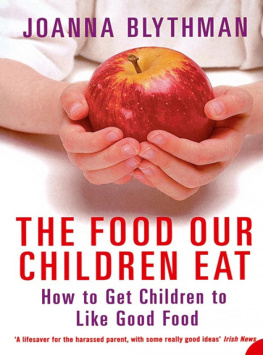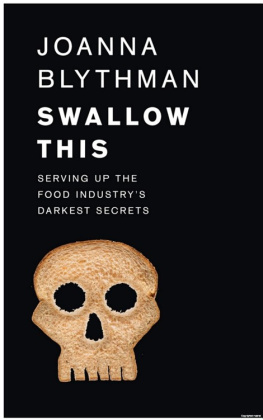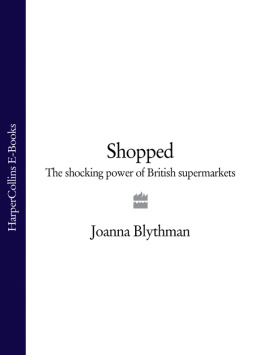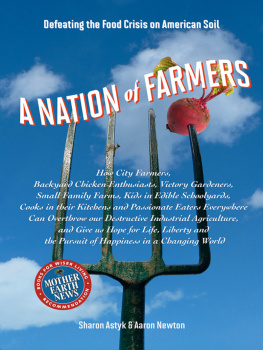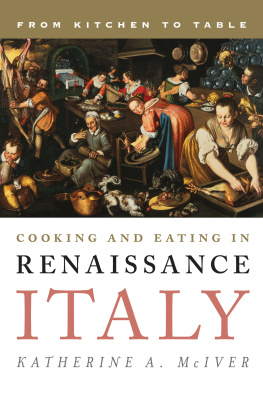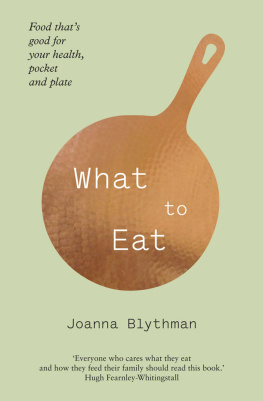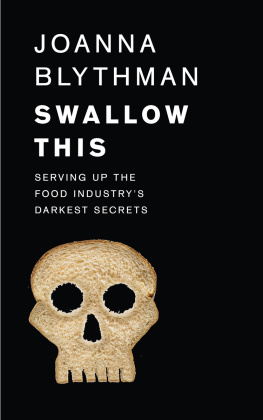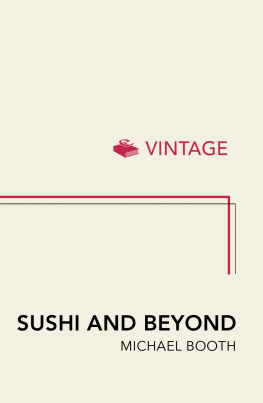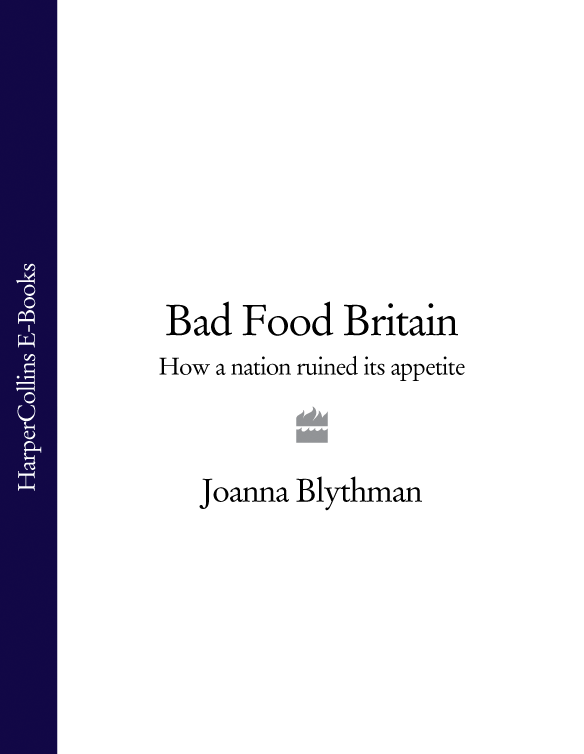
BAD FOOD BRITAIN
JOANNA BLYTHMAN

For Derek Cooper
CONTENTS
One afternoon in early 2006, my phone rang. It was a fellow journalist looking for quotes for an article he was writing about the significance of Britains doyenne of food writers, Elizabeth David. Was it thanks to her that we have become a nation of foodies? he wanted to know. The next morning, the Today programme on Radio 4 was repeating a story about how sales of olive oil in Britain were now outstripping those of all other cooking oils put together, a phenomenon attributed to Britains increasing sophistication in food taste yet another manifestation of the nations much-vaunted food revolution.
Nation of foodies! Food revolution! Who are we kidding? British eating habits are getting worse, not better. In reality, Britain is second only in notoriety to the United States in the bad food stakes. Of course, this flies in the face of the perceived wisdom that we are in a Youve Never Had It So Good phase of British gastronomy, in the throes of a dynamic food renaissance. After all, isnt Londons restaurant scene the envy of the rest of the planet? What about all the farmers markets, regional food festivals, and new artisan food products that are popping up left, right and centre, the length and breadth of the land? And how about our regiment of chef celebrities? Isnt cool Food Britannia a runaway success? At last, after all those decades of cringing on the world food stage, surely we can now strut our stuff with conviction, and show off our new-found gastronomic credentials.
This is how Britain likes to see itself nowadays, as a fully functioning, participatory food culture. In truth, this vision is a chimera, an unconvincing construction built and talked up by the media, the chattering classes, the hospitality, tourism and food industries, and TV chefs on the make. It is a delusion that selectively ignores the gaping discrepancies that dont fit the story:
Our growing incompetence in the domestic kitchen and the endangered status of home cooking surely one of the most telling indicators of a nations culinary health.
Our inability to feed our children on a diet of life-sustaining, healthy food, either at home or at school.
The stifling of an independent local grocery sector or small food commerce under the hulking boot of supermarket monoculture.
Our addiction to industrial techno-foods.
Our growing resistance to devoting any time to food shopping or preparation.
Our unwillingness to take the time to eat a meal.
Our bulging waistlines.
Our city centres studded with chain eateries and gastropubs where everything on the menu comes straight out of a lorry into the freezer, and from there to the microwave or deep-fat fryer.
Our near dependence on foreign cuisines because of the weakness of our own native one.
And thats just for starters!
This book explores all the contemporary manifestations of Britains unhappy relationship with food; the embedded ideas, patterns and practices that keep us locked in a Bad Food mindset and which feed the nations profound gastronomic illiteracy. Not the least of our current troubles is our inability to admit that something is wrong. Like an alcoholic who cant accept that he or she has a drink problem, Britain is in denial that it has a Bad Food problem. Yet such an acceptance is a necessary preliminary to identifying creative solutions that might enable us to appreciate the pleasure we might derive from better food, and in the process transform the quality of our life.
Bad Food Britain is not a history book, although the roots of Britains current difficulties with food would richly reward such an approach. Perhaps the weak food culture in Britain is due to early industrialization, and a consequent rapid growth of an urbanized population divorced from the countryside and food production? Religion may play its part in the form of a Protestant work ethic which spawned a breed that would rather build an empire or factory than waste hours preparing and eating food; a peculiarly Anglo-Saxon form of Puritanism which holds that it is immoral to enjoy or cherish food too much, parsimony and abstinence being the higher goals. Other factors might include our grey northern climate, the legacy of post-war rationing, our close identification with the United States and time is money American capitalism. Or might it be a matter of simple xenophobia, complicated by a fine overlay of class; the notion that food is something fancy that only foreigners, or those who ape them, enjoy? Whatever the historical explanation, the fact remains that food never has been a British priority and shows no signs of becoming one in the near future.
One of the most amusing but telling insights I happened on in the course of writing this book was the following letter, published in The Times during the wave of concern that flowed through Britain in the wake of the transmission of Jamies School Dinners:
Sir,
A letter from my daughters primary school in Essex reads:
Change to the School Menu
In response to recent publicity, Turkey Twizzlers have been taken off the school menu and replaced by Chicken Teddies.
What is it about the British and food? We just dont get it, do we? Well, its time that we did.
1
FANTASY FOOD
Britain lives in a fantasy food world, a virtual food state. Our shelves are laden with cookbooks. Books about eating or cooking are never out of the bestsellers lists. In 2005, cookbooks already one of the book trades richest earners reached new money-spinning heights. that has stretched its sticky, lickable hands across society.
The pages of weekend supplements are populated by beautiful people plucked from a nation of lip-licking gastronomes, a nation that grows food, cooks food and rejoices in the eating of it. They live in lofts and stylish townhouses, or depending on the newspapers readership profile in covetable country houses and holly-hocked cottages. Wherever they are located, these people are ultra-literate in food and gastronomy. They take a great interest in foodie arcana, soaking up articles on items such as shade-grown peppercorns and salted, sundried Sardinian tuna roe, like children devouring the latest Harry Potter book. They weigh up the pros and cons of Lacanche ranges versus Agas. It matters to them that their crme brule is correctly caramelized, so they give each other blow torches as Christmas presents. They are endlessly fascinated with the contents of famous peoples refrigerators. Their own capacious American-style, double-door fridges are filled with organic goats milk yogurt, juice squeezed from English heritage apples and Toulouse sausages made from rare breed, acorn-fed porkers. They savour obscure cocktails dreamed up by someone purporting to be the worlds most innovative mixologist. Their shelves are stacked with at least six different estate-bottled extra virgin olive oils. Their drawers are filled with expensive Japanese knives as recommended by Bad Boy chef, Anthony Bourdain. These people constantly give dinner parties or, more fashionable these days, informal, relaxed suppers for foodie friends. They are tuned into every little nuance of food provenance, seeking out products of impeccable pedigree as they navigate their way around farmers markets, specialist food shops and mail order companies supplying everything from samphire to smoked eel. When you see the picture of them sitting around their craft-made dinner table, hewn from a vast trunk of fallen oak or elm by a local architect who downshifted to the country, they are surrounded either by adorable, food-appreciating offspring weaned on pured allotment parsnips, or by stimulating food enthusiast guests. Attentive readers of
Next page

